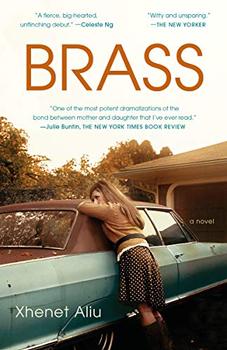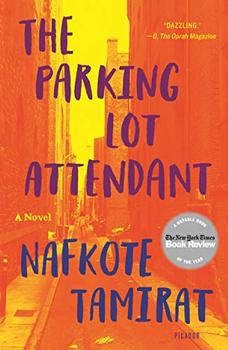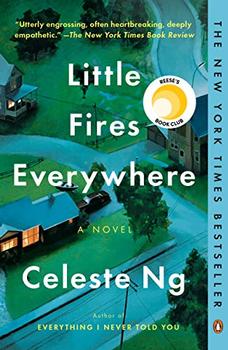Summary | Excerpt | Reviews | Beyond the book | Read-Alikes | Genres & Themes | Author Bio

In 1996, Waterbury, Connecticut is a town of abandoned brass mills. Eighteen-year-old Elsie Kuzavinas explains that the industry "hauled ass out of town" a few decades ago. The move left her father unemployed, while her mother continued to work for the Mounds/Almond Joy factory in nearby Naugatuck.
Elsie's language immediately gives us a taste of her sassy voice. A second-generation Lithuanian-American, she is desperate to leave town and escape her parents' blue-collar example, but ends up working at the local Betsy Ross Diner instead. Here she falls for an Albanian line cook named Bashkim Hasani. Bashkim frequently tells Elsie she's the most beautiful woman he's ever seen. Even though she knows Bashkim has a wife back in Albania, Elsie allows their relationship to progress and soon discovers that she is pregnant. We follow Elsie's story from this point until she gives birth to Luljeta, aka Lulu.
Elsie's narrative alternates with chapters narrated by teen Lulu seventeen years later. Lulu has just received a rejection letter from NYU and been suspended for fighting with a classmate. Even though Bashkim has never been a presence in her life, Lulu can't stop thinking about her father and extracts his story from Yllka, the diner owner. Learning that he moved to Houston to open a pizzeria, Lulu sets off on a road trip to Texas to find him.
The novel is thus set up around two parallel journeys: Elsie's towards motherhood, and Lulu's towards the truth about her father. Despite her apprehension, Elsie maintains her sense of humor about her situation: the baby is due on April Fool's Day, and she jokes that with its mixed Lithuanian and Albanian heritage it will be "a mutt, which everyone knows are stronger, smarter, healthier breeds." Like the proverbial melting pot, Lulu is to be a symbol of different cultures and histories adding up to make a resilient American. Elsie has always wanted Lulu to have a better life than hers.
Bashkim takes a backseat to the strong female protagonists, but his story illustrates the disillusionment that can set in when the American dream goes sour. He was born in an Albanian work camp (see Beyond the Book), but never stopped believing that he would strike it rich in America. Although his various investments (including a pyramid scheme that ate up a loan from Elsie's sister) turned out poorly, he didn't give up hope. His mantra, as Elsie describes it: "An impossible dream was better than no dream at all."
Brass is a striking portrait of the immigrant and second-generation experience in America. I especially liked how Xhenet Aliu—who has previously published a short story collection and is herself from Waterbury, CT and the daughter of an Albanian father and Lithuanian-American mother—weaves in different uses of the title "brass," as in "brass knuckles," "brass trumpets" and a "brass knocker." An inscription above Waterbury's City Hall reads (in Latin) "What is more lasting than brass?" Elsie keeps asking herself that same question. Will her love for Bashkim and the shaky stability of their new family last longer than the brass mills did in town? Though never stated in the book, it is possible that some readers might apply the unflattering adjective "brassy" to these outspoken narrators.
Lulu tells her story in the second person, distancing herself from her unhappiness by shifting it onto a nameless "you," as in "you feel like you ended up in a family that isn't really yours." My only misgiving about the novel was the extended use of this second-person narrative. I have encountered it in individual short stories or book chapters before but have rarely seen it take such a significant role in the narration of an entire novel. I found it experimental and a little bit strained; couldn't Aliu have told us Lulu's story in the first or third person instead?
I suspect some readers will find the style of the narration off-putting, but most, I hope, will be able to overlook it and sink into a touching story of the American working-class struggle and motherhood against the odds.
![]() This review was originally published in The BookBrowse Review in February 2018, and has been updated for the
January 2019 edition.
Click here to go to this issue.
This review was originally published in The BookBrowse Review in February 2018, and has been updated for the
January 2019 edition.
Click here to go to this issue.

If you liked Brass, try these:

by Nafkote Tamirat
Published 2019
A mesmerizing, indelible coming-of-age story about a girl in Boston's tightly-knit Ethiopian community who falls under the spell of a charismatic hustler out to change the world

by Celeste Ng
Published 2019
Winner of the 2017 BookBrowse Fiction Award
From the bestselling author of Everything I Never Told You, a riveting novel that traces the intertwined fates of the picture-perfect Richardson family and the enigmatic mother and daughter who upend their lives.
Knowledge is of two kinds. We know a subject ourselves, or we know where we can find information on it.
Click Here to find out who said this, as well as discovering other famous literary quotes!
Your guide toexceptional books
BookBrowse seeks out and recommends the best in contemporary fiction and nonfiction—books that not only engage and entertain but also deepen our understanding of ourselves and the world around us.